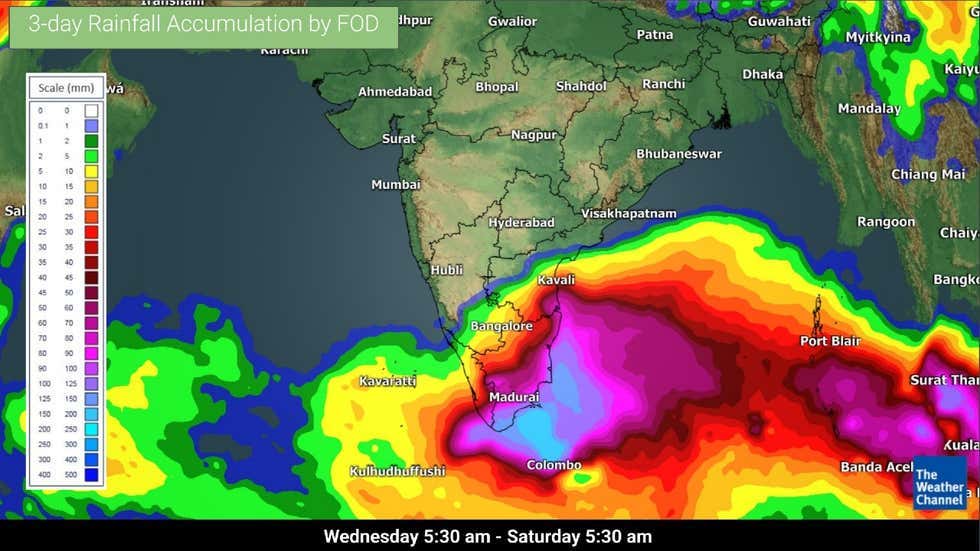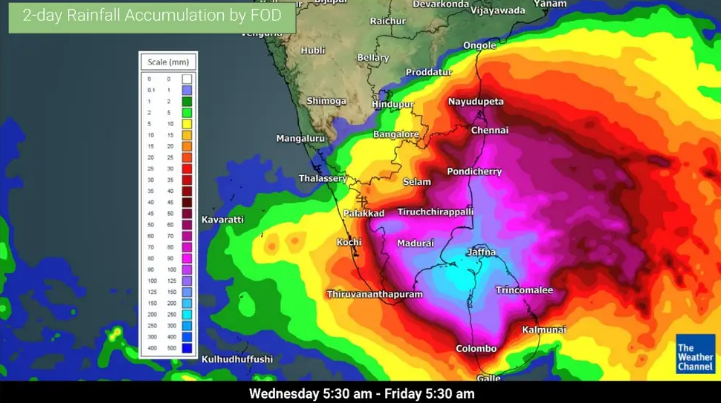
#CycloneBurevi to Cross Sri Lanka on Wednesday; Kerala, Tamil Nadu Under Red Warning
weather.com/en-IN/india/ne…
By- @deekshith_np
(📸: L R Shankar/TOI, BCCL, Chennai )
weather.com/en-IN/india/ne…
By- @deekshith_np
(📸: L R Shankar/TOI, BCCL, Chennai )

#CycloneBurevi | In less than a week after #CycloneNivar swept past Tamil Nadu and Andhra Pradesh, another cyclone started to brew over the Bay of Bengal.
The low-pressure area lingering over the Bay intensified into a depression during early hours of Monday.
The low-pressure area lingering over the Bay intensified into a depression during early hours of Monday.
As per the India Meteorological Department (IMD) forecast, the system is likely to intensify into a ‘deep depression’ by Monday night and further into a cyclonic storm by Tuesday morning.
Once the system intensifies into a cyclone, it will be named ‘Burevi’ as per the naming guidelines set by the World Meteorological Organisation (WMO).
Unlike Nivar, Burevi may not turn into a very severe cyclone as the Bay of Bengal lacks the energy to feed the system further.
Unlike Nivar, Burevi may not turn into a very severe cyclone as the Bay of Bengal lacks the energy to feed the system further.
Burevi will be the fifth cyclone over the North Indian Ocean this year, after Amphan, Nisarga, Gati and Nivar. It is expected to be the least destructive of all if the projections hold true. 

The depression coupled with a cyclonic circulation is pulling away from the Nicobar Islands and currently located over the southeast Bay of Bengal. The system will progress west-northwestward toward Sri Lanka and cross the island country’s coast by Wednesday night.
Moreover, the Cyclone Burevi is very likely to emerge again into the open seas into the Comorin area on Thursday morning, as per the IMD forecast.
If the system maintains its strength till then, the cyclone will linger for much longer, inducing heavy rains and strong winds across southern Tamil Nadu and Kerala.
Under the influence of the potential cyclone, widespread rainfall is forecast across Sri Lanka, Tamil Nadu, South Andhra Pradesh and Kerala between Tuesday and Friday with a likelihood of isolated extremely heavy rainfall on Wednesday and Thursday. I 

Historically, eight out of ten deadliest tropical cyclones in the world have originated over the #BayofBengal.
In fact, out of the 36 most deadly tropical cyclones in the recorded history, 26 have been over this region.
In fact, out of the 36 most deadly tropical cyclones in the recorded history, 26 have been over this region.
• • •
Missing some Tweet in this thread? You can try to
force a refresh










